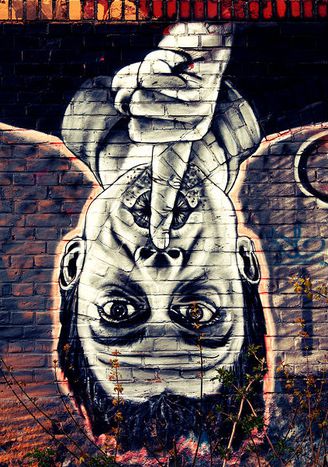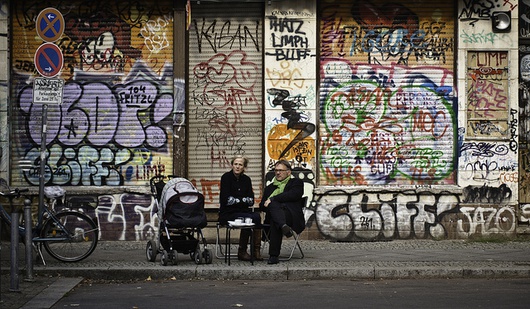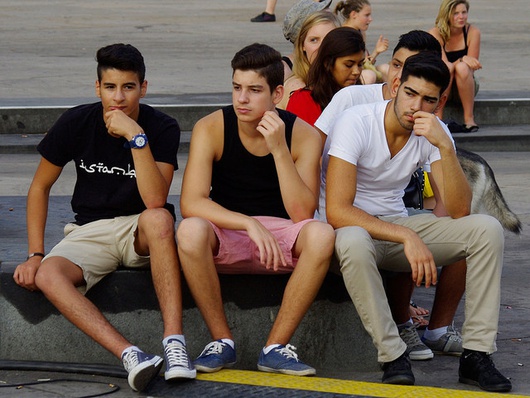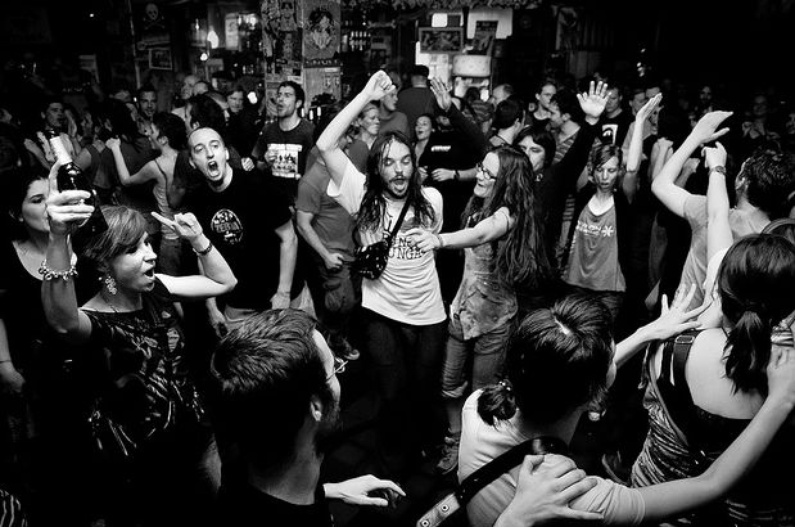
"Voll nice!" How to get the hang of Berlin Slang
Published on
Translation by:
 Danny S.
Danny S.
Having barely just arrived in Berlin, every newcomer will quickly learn to choose their words. In the trendy German capital, you won't just have to navigate between the Berlin dialect and a plethora of foreign languages, but you will also have to familiarise yourself with Berliner slang. With this small lexicon in hand, getting off to a good start won't seem so daunting.
Whether or not you are cool in Berlin depends largely on one seemingly unimportant word. As of recently, it is not cool in German to say 'cool' anymore. Instead, everything that seems interesting, novel or praiseworthy is now 'nice'. In response, one would assume that this has to do with the constantly growing number of English-speaking foreigners who call Berlin home, and who confine themselves to speaking only English as they meander through Kreuzkölln and Friedrichshain. But that seems rather implausible, considering that there doesn't seem to be a Renaissance of the word 'nice' in international English. Instead, the unimpressive word is uttered almost exclusively by young Germans who seem to be getting slowly bored with the ridiculously overused term 'cool'.
Berlin is cute... or what?
 Even though Berliners have rather little to do in comparison to their friends in cities like London, New York and Beijing, they don't lose time over words and prefer everything to be short, quick and catchy. That is why only tourists and the uninitiated say Schlesisches Tor, Görlitzer Park or Kottbusser Tor. Out of the mouths of Berliners, you will only hear things such as "Schlesi", "Görli" or "Kotti". The same applies to many other frequently used words: The famous Spätkauf (corner shop) — itself a pretty bizarre word construction — turns into "Späti", the "öffentliche Verkehrsmittel" (public transport) into "Öffis", while the widely drunk "Sternburger beer" becomes a "Sterni". If you want to sound cool in German, you definitely won't get around these abbreviations, but you should also be careful not to use too many in one sentence.
Even though Berliners have rather little to do in comparison to their friends in cities like London, New York and Beijing, they don't lose time over words and prefer everything to be short, quick and catchy. That is why only tourists and the uninitiated say Schlesisches Tor, Görlitzer Park or Kottbusser Tor. Out of the mouths of Berliners, you will only hear things such as "Schlesi", "Görli" or "Kotti". The same applies to many other frequently used words: The famous Spätkauf (corner shop) — itself a pretty bizarre word construction — turns into "Späti", the "öffentliche Verkehrsmittel" (public transport) into "Öffis", while the widely drunk "Sternburger beer" becomes a "Sterni". If you want to sound cool in German, you definitely won't get around these abbreviations, but you should also be careful not to use too many in one sentence.
 Once you have mastered the language of hip self-designated Berliners, you will have to grapple with the cheerfully brash "authentic" Berlin dialect, which across Germany is known pejoratively as the "Berliner Schnauze," or Berlin muzzle. Most of us have probably already heard that in Berlin, "Brötchen" (bread rolls) are called "Schrippen". Even the shift in ending consonants that turns words such as "ich" (I) into "icke", "was" (what) into "wat" and "das" (that) into "dit", is something you can quickly adapt to. But when initial sounds sich as G are changed to J, and when verbs are competely exchanged for others, newcomers will definitely need a few weeks to cope: "Kiek doch, wo de hinjehst!" (Look out where you're going!)
Once you have mastered the language of hip self-designated Berliners, you will have to grapple with the cheerfully brash "authentic" Berlin dialect, which across Germany is known pejoratively as the "Berliner Schnauze," or Berlin muzzle. Most of us have probably already heard that in Berlin, "Brötchen" (bread rolls) are called "Schrippen". Even the shift in ending consonants that turns words such as "ich" (I) into "icke", "was" (what) into "wat" and "das" (that) into "dit", is something you can quickly adapt to. But when initial sounds sich as G are changed to J, and when verbs are competely exchanged for others, newcomers will definitely need a few weeks to cope: "Kiek doch, wo de hinjehst!" (Look out where you're going!)
My Kiez, your Kiez, our Kiez?
Another term, which systematically jumps at you in Berlin, is the famous "Kiez". What is known in other places as "Stadtviertel" (city district), is affectionately designated in north-eastern Germany - above all in Berlin - as "my Kiez". In the past, very few districts belonged to the true "Berlin Kieze", but today almost everyone calls their neighborhood a "Kiez", characterised by their favorite bar and their local "Späti". If you have only just moved to Berlin, you shouldn't of course use the term after the first two days because the obsessive overuse of the word is one of the most obvious signs of a "wannabe Berliner".
 Now, malicious tongues might claim that the degree of being "cool" isn't dependent on word choice. Be that as it may, you can still quickly be designated as a tourist or a newcomer in the Berlin party scene if you use the wrong words. The request "Komm rum!" (Come round!) doesn't mean that you should follow someone around the corner, but rather that you should stop by someone's house or join them at a party. If you order a "Pfeffi" at the beginning of a long club night, you have a bilious green peppermint liqueur in mind. All those, however, who still say "disco" when talking about "clubs", are unlikely to receive a warm welcome in the German capital. If there is one thing to take a mental note of, it is the fact that in Berlin there's no such thing as "Party machen" (partying, literally "making" a party). Here, everyone will use the term "feiern" (celebrating) instead. After all, parties are less of an organised activity and more about the hedonistic pursuit of pure fun. And that is, languages barriers or not, exactly why Berlin is "voll nice".
Now, malicious tongues might claim that the degree of being "cool" isn't dependent on word choice. Be that as it may, you can still quickly be designated as a tourist or a newcomer in the Berlin party scene if you use the wrong words. The request "Komm rum!" (Come round!) doesn't mean that you should follow someone around the corner, but rather that you should stop by someone's house or join them at a party. If you order a "Pfeffi" at the beginning of a long club night, you have a bilious green peppermint liqueur in mind. All those, however, who still say "disco" when talking about "clubs", are unlikely to receive a warm welcome in the German capital. If there is one thing to take a mental note of, it is the fact that in Berlin there's no such thing as "Party machen" (partying, literally "making" a party). Here, everyone will use the term "feiern" (celebrating) instead. After all, parties are less of an organised activity and more about the hedonistic pursuit of pure fun. And that is, languages barriers or not, exactly why Berlin is "voll nice".
Translated from Voll nice! Berliner Szenesprache


